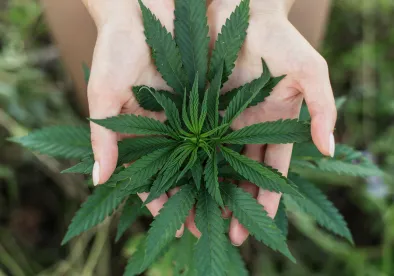On Friday, the United States House of Representatives voted to approve The Marijuana Opportunity and Expungement Act (MORE Act),[1] which would decriminalize cannabis. This vote marks the first time that a chamber of Congress voted on a standalone cannabis bill. While the 228-1164 vote passed mostly on party lines, 5 Republicans voted in support of the bill, and 6 Democrats voted against.
In addition to removing cannabis from the list of Schedule 1 controlled substances identified in the Controlled Substances Act (CSA), the MORE Act would also: (i) allow states to set their own cannabis-related policy, eliminating federal intervention; (ii) require federal courts to expunge prior convictions for cannabis-related offenses; (iii) remove criminal penalties for those who manufacture, distribute, or possess cannabis; and (iv) establish a 5% tax on cannabis product sales to establish a trust fund to reinvest in communities disproportionately impacted by the “war on drugs.” The tax revenue would also provide funds for small business loans and allow access to licensing and employment opportunities for economically marginalized individuals.
Proponents argue that the MORE Act would result in significant policy change that would, among other things, create a pathway for resentencing those incarcerated on cannabis-related offenses, protect immigrants from being denied citizenship over cannabis use, and prevent federal agencies from denying public benefits, such as housing, or security clearance due to an individual’s cannabis use.
The House bill was introduced July 2019 by Judiciary Chair Jerry Nadler,[2] and approved by the House Judiciary Committee in November of the same year. Between this approval and Friday’s House vote, changes have been made to the MORE Act that critics say diminish the criminal justice and social equity provisions of the bill. Such changes include narrowing where tax dollars can be appropriated and who would be eligible for records expungement.
However, this historic vote on cannabis – which would be momentous for the multibillion-dollar cannabis industry[3] – will likely remain largely symbolic. Up next, the MORE Act faces the Republican-controlled Senate, where Senate Majority Leader Mitch McConnell already criticized the House for moving on the bill instead of passing parts of the COVID-19 stimulus bill mutually agreed on by both parties. Any bill not signed into law by the time Congress adjourns on January 3, 2021 must be reintroduced. Given the fact Republicans have largely resisted shifting national attitudes on cannabis, this is the fate that will most likely befall the MORE Act, or any other prominent cannabis-centric legislation.
Despite this grim outlook, many believe this vote was intended to show the incoming Biden administration that it is serious about cannabis reform and that it expects the administration to advance the ball on legalization or descheduling.
According to Andrew Bates, spokesperson for the Biden transition, President-elect Joe Biden would allow states to continue to make their own choices regarding legalization and would seek to make it easier to conduct research on cannabis’s health impacts by rescheduling it as a Schedule 2 drug under the CSA. In the past, the Biden team has indicated the President-elect supports decriminalizing cannabis and the automatic expungement of prior criminal records for cannabis possession, but not full legalization of the product.
While the federal position may be advancing inch by inch, states have legalized cannabis and stood up their own regulated markets since 2012 without major federal interference. This election cycle, 5 states voted to legalize cannabis, either for medicinal or recreational purposes (or both in the case of South Dakota), bringing the current national total to 15 states where recreational use and 36 states where medical use are legal.[4] Moreover, even more states are eyeing legalization in the coming years, including Connecticut, New Mexico, New York and Pennsylvania.
Additionally, earlier this week, the United Nations Commission on Narcotic Drugs removed cannabis from its schedule of dangerous drugs, a move that could accelerate global medical cannabis research and decriminalization efforts. As it relates to the U.S., the UN’s decision could affect how the US DEA approaches cannabis, and could be a further indication that federal legalization is on the horizon.
FOOTNOTES
[1] Please see a prior article on the MORE Act here.
[2] California Senator Kamala Harris, now Vice President-elect, introduced a companion bill in the Senate, but it was stuck down in the Republican-controlled Senate Finance Committee.
[3] According to cannabis market research firm the Brightfield Group, the U.S. cannabis industry is expected to post north of $19 billion in sales this year,.
[4] See prior article on the recent “Green Wave” here.



 />i
/>i

